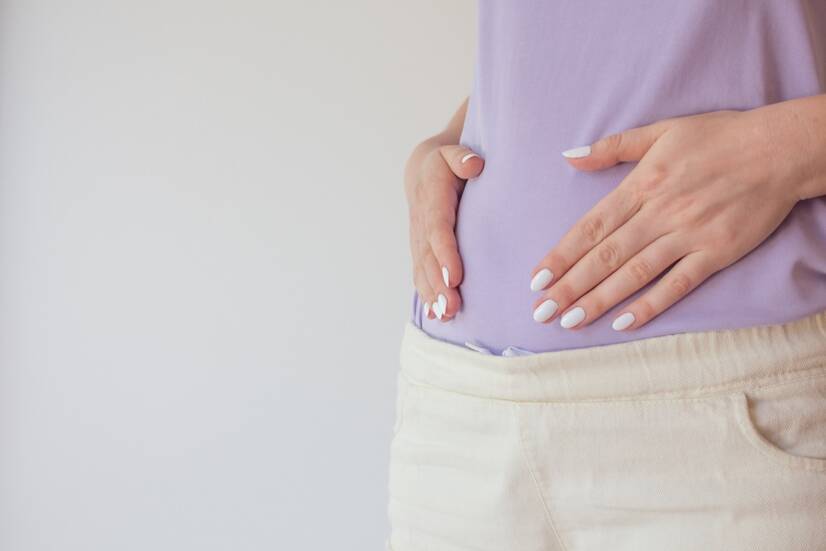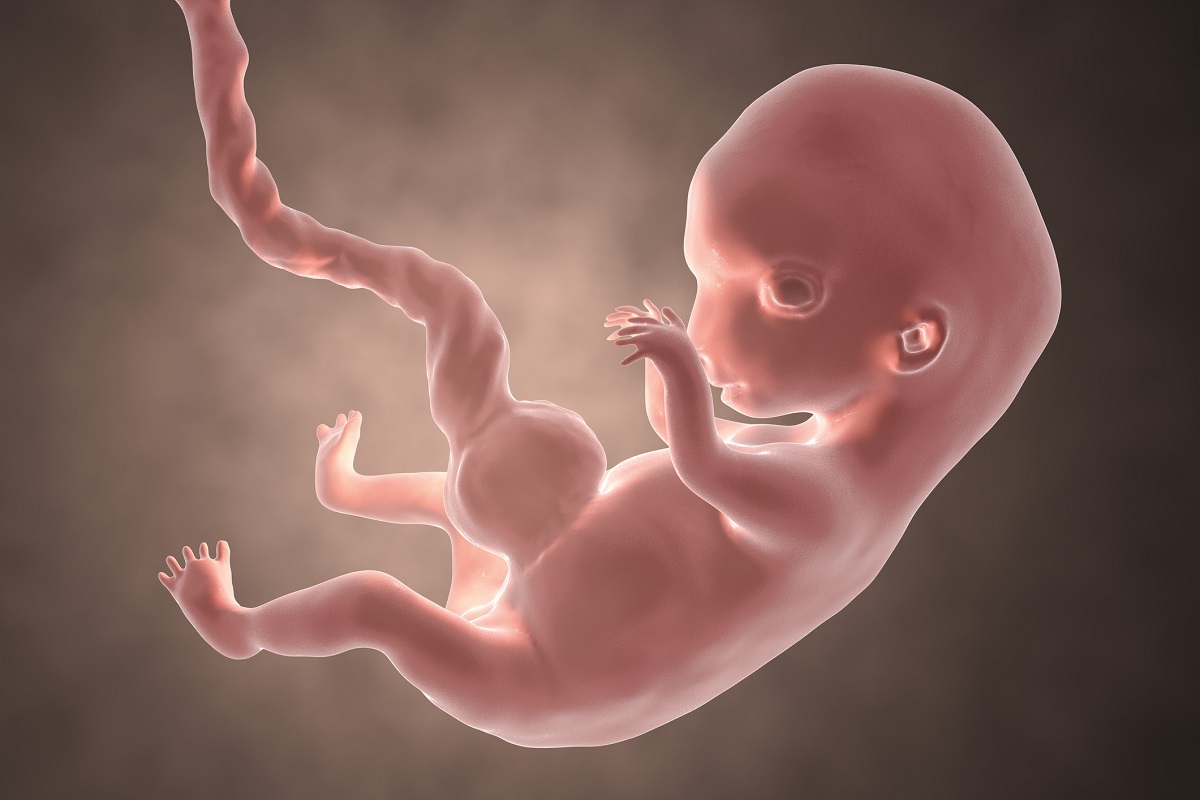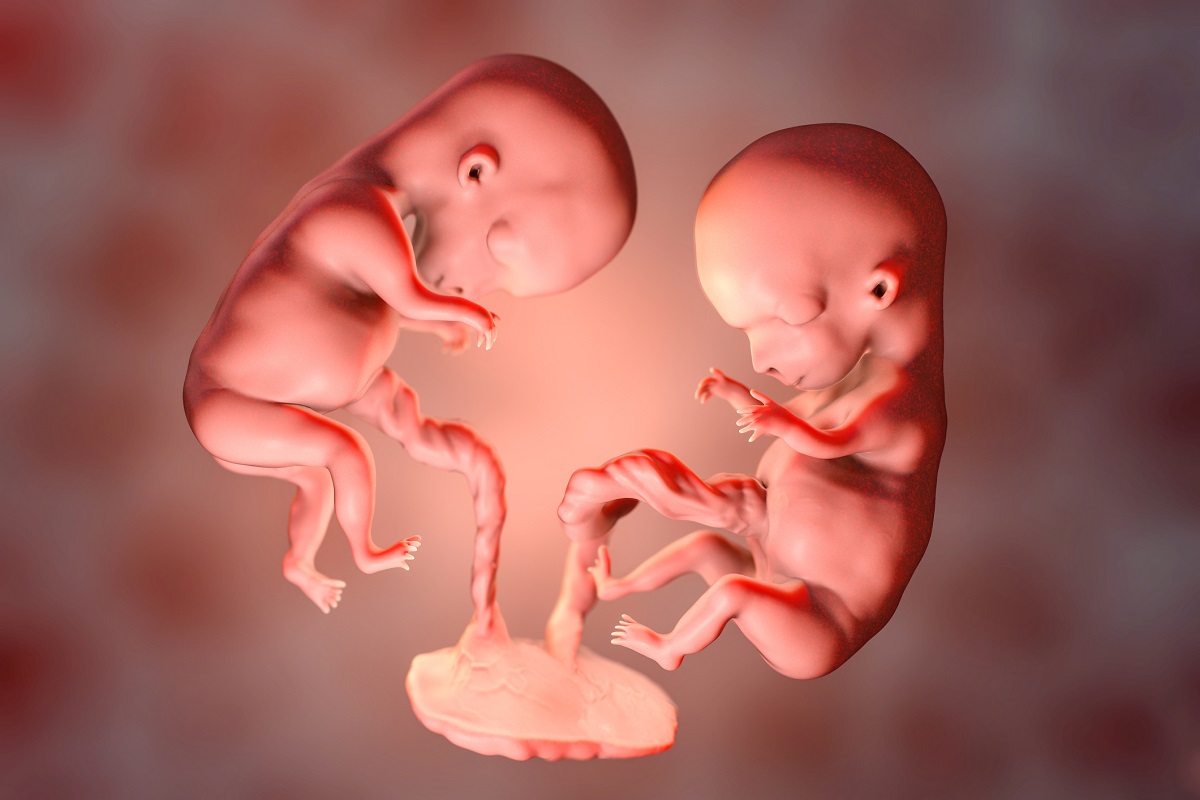- Pregnancy and childcare: Jane Symons
- General Kinesiology: Dylevský Ivan
- verywellfamily.com - Week 8 of Your Pregnancy
- whattoexpect.com - 8 Weeks Pregnant
- healthline.com - 8 Weeks Pregnant: Symptoms, Tips, and More
- flo.health - 8 Weeks Pregnant
8th week of pregnancy: is the embryo starting to resemble a baby?

Even if your pregnancy is not yet visible on the outside, big changes are happening in your body. The same is true for your baby, who is in constant rapid development. You can read how your baby is developing this week in our article.
Article content
You are 8 weeks pregnant, in your first trimester, and are finishing your 2nd month of pregnancy.
How is your baby developing in your tummy?
Your baby is growing very fast, up to a millimetre a day. He is growing not only in length but also in width. His arms, legs and back are also growing.
The size of the embryo at 8 weeks is approximately 2 cm and the weight is 1 gram.
Last week your baby was only 1 cm. Now it is approximately 2 cm long and will multiply again by next week. It is nice to see how fast your baby is growing.
You can read more about fetal size in the article:
Ultrasound in pregnancy: fetal size, what is fetal biometry?
The fetus is beginning to resemble a baby.
Facial features are beginning to develop.
The lips, eyelids and nose are forming.
Retinal development has also begun in the eye.
The mouth already has a small tongue, the taste buds are beginning to form.
The ears continue to develop in the inner part and the outer side of the head is already beginning to form.
By the end of the week, all the major organs will begin to develop.
The lungs, stomach and intestines are beginning to develop. However, there is not yet enough room in his small body for the intestines to develop in the tummy, so his intestines develop externally in the umbilical cord section. Later in development, when space in the tummy becomes available, they move into the abdominal cavity.
From the genitalia, the ovaries or testicles are already beginning to develop. You will have to wait to find out if it is a boy or a girl growing in your tummy.
The shoulders, hips, elbows, and knees are nicely distinguishable by sonographic examination.
The limbs are becoming clearly visible and the fingers and toes have started to be distinguished.

His tail is almost gone due to the growth of his body.
Bones are beginning to form, in the collarbone and on the face, in the jaw area.
At the end of the 8th week, the bases of the neck muscles are distinguished. The development is characterized by the curvature of the dorsal part of the embryo.
The spinal cord is growing. So far, the cervical part of the spinal cord is dominant, which will soon change with growth and development.
The spinal reflex arc closes and develops its functionality.
The embryo begins to show motor activity. It's manifested as gentle twitching. The embryo moves by turning its trunk and head. The baby is even stretching.
The fetus is still being nourished from the yolk sac and the placenta, although the placenta is not yet fully functional and is still developing.
The embryo's heart beats regularly at a rate of approximately 150 to 170 beats per minute.
The volume of amniotic fluid in which the embryo is contained gradually increases.
The development of the twins
If you are expecting twins, your babies are developing and starting to look more and more like babies.
You may feel the symptoms of pregnancy more intensely, especially extreme tiredness. Your tummy is getting bigger faster than when you are expecting one baby.

How does a woman feel at 8 weeks pregnant?
Pregnancy symptoms are felt differently by every woman, even each pregnancy is different. Some women even have no symptoms at all throughout their pregnancy.
Your uterus is getting bigger. By the end of the 8th week, it will have grown to the size of a large orange.
Your clothes feel like they've shrunk, and they start to feel tight around your belly.
Even though your tummy is not yet visible to the outside world, you already know it. You also already feel pregnant, especially if you are suffering from pregnancy symptoms.
There's a lot of pregnancy hormones circulating in your body. You can feel premenstrual syndrome, which is a weepy, emotional sensitivity. You get upset easily.
Morning sickness, which sometimes occurs during the day or even at night, may persist throughout the day. If you are unable to eat anything during the day and your weight is dropping, see your gynaecologist. The doctor will prescribe medication to relieve morning sickness.
The good news is that the nausea will subside by the 12th to 14th week of pregnancy, and then you will finally feel better.
Heartburn may occur more frequently than before. Therefore, try to avoid foods that trigger this unpleasant sensation. Reach for a more easily digestible diet.
Fatigue or exhaustion is the most common symptom of pregnancy in the first trimester. It subsides in the second trimester and returns in the last trimester, towards the end of pregnancy.
Your body is exerting a lot of effort and you feel exhausted and lack energy. You just want to sleep or rest. It's quite normal that you can't wait for the evening when you can finally lie in bed and get some sleep. Getting up in the morning is also more challenging and you often don't want to get out of bed.
The cause of your tiredness is your pregnancy hormones. In your uterus, the placenta is forming, which will nourish your baby. Extra blood is building up and pumping through your bloodstream. Also, your heart is working a little faster than before pregnancy.
An increased amount of vaginal discharge that is thin, milky in colour is called leucorrhoea. Increased levels of the hormone oestrogen circulate the pelvic floor, and this is when the increased production of vaginal discharge begins.
There is a reason for the discharge. Pregnancy discharge protects the birth canal from infection, removes dead cells from the vagina and maintains the balance of healthy bacteria found in the vagina.
You can read more about discharge in pregnancy in the article:
Discharge in pregnancy: what is considered normal discharge? And how does infection manifest itself?
The feeling of bloating and flatulence is caused by the hormone relaxin, which relaxes the muscles. This also slows down the intestinal peristalsis. Food is processed more slowly and stays longer in the intestines. There it subsequently ferments, causing flatulence.
Very often these symptoms are accompanied by unwanted constipation caused by the longer passage of stool through the intestines. Therefore, remember to take in fibre in your diet and plenty of fluids to avoid constipation.
You can read more about constipation in pregnancy in the article:
Dangerous constipation in pregnancy? What to do for constipation and how to defecate without difficulty?
Strange food cravings are unexplainable in pregnancy. Previously, you would not even think of eating food in the combination that you are craving at this time of pregnancy.
Instead of having a big appetite, food aversion can also occur. Just looking at it can make your stomach rise, leading to subsequent nausea.
Often there is a combination of craving and aversion. You have a craving for a food. You dig in with gusto, enjoy it, and suddenly your stomach tells you to stop. If you took one more bite in your mouth, it would be all out. That's what pregnancy cravings are.
There may be headaches in the temple area. These are probably caused by increased blood volume and circulation in the body.
You may start to get pregnancy spots on your skin called chloasma. These spots are caused by pregnancy hormones. They cause spots on your face that are darker in color than your skin color.
You may also see darkening of your skin on your lips, on your moles, which are slightly darker than they used to be. Also, above your pubic bone towards your belly button, where a dark-coloured line called the linea nigra may start to form. Your nipples and areolas also start to darken.
Weight gain. Your weight has most likely already increased somewhat if you are not suffering from nausea and vomiting. If you are nauseous, your weight may decrease. Gaining weight in pregnancy is not the same and you will gain a different amount of weight in each month.
How much weight to gain during pregnancy, you can read in the article:
How much to gain during pregnancy? What does it depend on and what to look out for?

A heightened sense of smell often comes with nausea. A whiff of a smell that you smell can make you feel nauseous and trigger nausea. Therefore, try to avoid smells and odours that irritate you.
Strange dreams are normal during pregnancy. Your dreams seem vivid and strange. It is not clear exactly what triggers these dreams, but you are going through major changes full of new ideas.
Occasional cramps in the abdomen are caused by the growth of the uterus and are quite normal. Gas or constipation may also contribute to the stretching of the abdomen and the feeling of cramps.
If abdominal cramps occur frequently or are intense and occur suddenly, see your gynaecologist. He will check that everything is fine and developing as it should.
If the cramps come regularly, are painful, or if there is a pinkish or blood-tinged vaginal discharge, visit the nearest hospital immediately. It may be the beginning of a miscarriage.
Read more about the signs of an incipient miscarriage in this article:
Miscarriage: what are the types and stages of miscarriage?
Feeling faint and dizzy is triggered by pregnancy hormones. They cause your blood vessels to dilate, and this lowers your blood pressure.
Dizziness can also be caused by low blood sugar. Therefore, always carry some snacks to nibble on in case of dizziness. Don't forget to drink enough to stay hydrated.
Your breasts are enlarging in preparation for breast milk production and breastfeeding. You may notice visible veins on the surface of your skin as your breasts become more engorged. The nipple and areola may become darker and your breasts are sensitive to touch and painful.
Frequent urination is caused by the enlarging uterus and its pressure on the bladder.
Visiting the gynaecologist at 8 weeks of pregnancy
When you visit the gynaecological outpatient clinic, your weight, height and your blood pressure will be measured.
Urine tests will become a regular occurrence for you. You will bring a regular urine sample to your gynaecologist's surgery. Your urine will be checked for the presence of proteins that indicate the onset of pre-eclampsia.
A blood test is done to confirm the pregnancy, to check your blood count to see if you are anaemic, to find out your blood group and Rh factor. The blood test also checks for infectious diseases that could pose a threat to the developing foetus.
You may or may not have an ultrasound.
Until now, you have had an ultrasound using a transvaginal probe inserted into your vagina. From week 8 onwards, it has been possible to monitor the foetus through the abdominal cavity.
If your doctor decides to check the fetal development with a sonogram, he will measure the CRL (the distance from the vertex to the coccyx) to check the growth of the embryo. He will check its development, heart rate, placenta placement in the uterus and the development of the fetal egg.
Between the 8th and 12th week of pregnancy, the exact length of the fetus is measured. The length is an accurate indicator for determining the due date and any changes in development, such as growth failure.
You will visit the clinic every 4 weeks during the first and second trimesters.
What we recommend and what to look out for
- Eat small portions of food so that you don't overload your digestive tract and thus prevent nausea.
- Add prenatal vitamins and folic acid to your diet.
- Drink plenty of fluids to stay hydrated. By staying hydrated enough, you will not only avoid dizziness but also constipation.
- Eat a healthy and wholesome diet. Avoid fatty, spicy and fried foods.
- Add fresh vegetables and fruits to your diet.
- If you feel tired, rest.
- Do not lift or move heavy objects.
- Avoid alcohol, cigarettes, drugs and harmful substances that could harm fetal development.
- If you have a pet in the household, leave the cleaning of its toilet to your partner or clean only with gloves.
- Wear a comfortable bra that will not press on your breasts.
- If your clothes start to feel tight around your belly, get clothes that are elasticated around the waist. They will adjust to your expanding tummy and will not press on it.
- Get plenty of exercise, go for walks or work out in the comfort of your own home. Exercise will keep you fit and you will feel much better.
- Pregnancy yoga will not only stretch your muscles, but also prevent possible pain in the hip and back area.
- It is recommended that you start practicing Kegel exercises. They are good for strengthening the pelvic floor, preventing unwanted urine leakage in the later part of pregnancy and helping you recover faster after childbirth.
What diet to avoid and what to look out for in pregnancy if you live with pets, you can read in the article.
Kegel exercises are practiced by contracting and relaxing the pelvic floor. Pull in the pelvic floor as hard as you can and then relax it. Try to pull in only the pelvic floor and not the abdominal or buttock muscles.
You can alternate this with another exercise where you gently relax the pelvic floor after the stretch and try to hold it for 10 seconds. Another exercise is to alternate the stretch and release quickly.
Read also interesting articles:
- How long does pregnancy last? How many days, weeks and months?
- In pregnancy, beware of anemia. What causes it, symptoms?
- You are pregnant and you are troubled by pain in the lower abdomen?
- How to recognize pre-eclampsia and its symptoms in pregnancy? Know the risks
- Sex in pregnancy. What to watch out for and what changes does it bring?
- Protein in the urine during pregnancy? May or may not be a problem
You can read more about fetal development in our article:
Pregnancyby weeks.
Gallery



Interesting resources
Related










